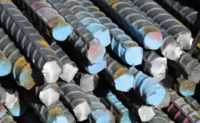Following a preliminary determination in March, the Dept. of Commerce has upheld a decision that duties should be imposed on Chinese solar photovoltaic cells and panels. Federal officials announced on Oct. 10 that the issue now goes to the International Trade Commission (ITC), which will uphold or reject Commerce's determination and impose specific duties on Nov. 7.
The case originates out of complaints by several American solar-technology manufacturers that China illegally dumped a large amount of solar cells and panels in the United States and other countries at below-market rates, aided by large subsidies from the Chinese government. The practice shuttered or required major layoffs at least 14 American solar technology manufacturers.
Commerce called for anti-dumping duties of 31.73% on imports of solar photovoltaic cells and panels from Suntech, 18.32% from Trina Solar, 25.96% from other companies that had requested but had not received individual duty determinations and 249.96% from all other Chinese producers. Additonally, the department recommended anti-subsidy duties of 14.78% for imports made by Suntech, 15.97% for Trina Solar and 15.24% for all other Chinese manufacturers.
Hillsboro, Ore.-based SolarWorld, which submitted the case in October 2011 on behalf of a coalition of seven American solar manufacturers, says it is only partially pleased with the determination.
Commerce did not alter its earlier determination on the scope of products affected by the tariff. China will face duties on photovoltaic cells produced or assembled into panels domestically, but the country can still use cells manufactured in countries not covered by the tariffs. That leaves a huge loophole for Chinese manufacturers, according to some solar manufacturers. "By leaving this 'loophole' … Commerce continues to expose U.S. manufacturers to Chinese unfair trade practices," said Gordon Brinser, president of SolarWorld Industries American, Inc., in a statement. "This will undercut the positive impact of Commerce's duties."
Brinser said that if the ITC upholds the duties, SolarWorld and the seven other solar manufacturers in the case plan to ask the Commerce Dept. and Customs and Border Protection to "pursue remedies to close the loophole," Brinser said.
Renewable energy experts say the impact of the tariffs could mean higher prices for solar projects, but that wouldn't necessarily mean fewer projects would be built. Dena Wiggins, a partner with the Washington, D.C., office of Ballard Spahr, LLP, law firm, says, "If the Commerce Dept.'s holding sticks, and these duties are going to be fairly significant, to the extent that these solar cells are coming in from China—they've going to be more expensive, and that's going to have to be factored into the economics of [projects]." But she adds that part of that calculus might include finding other sources of solar cells.
John Smirnow, vice president of trade and competitiveness with the Solar Energy Industries Association, says that his members will likely see little impact. Meanwhile, wind energy manufacturers have filed a similar trade case related to wind turbines manufactured in China. The Commerce Dept. is expected to rule in that case before the end of the year.



Post a comment to this article
Report Abusive Comment